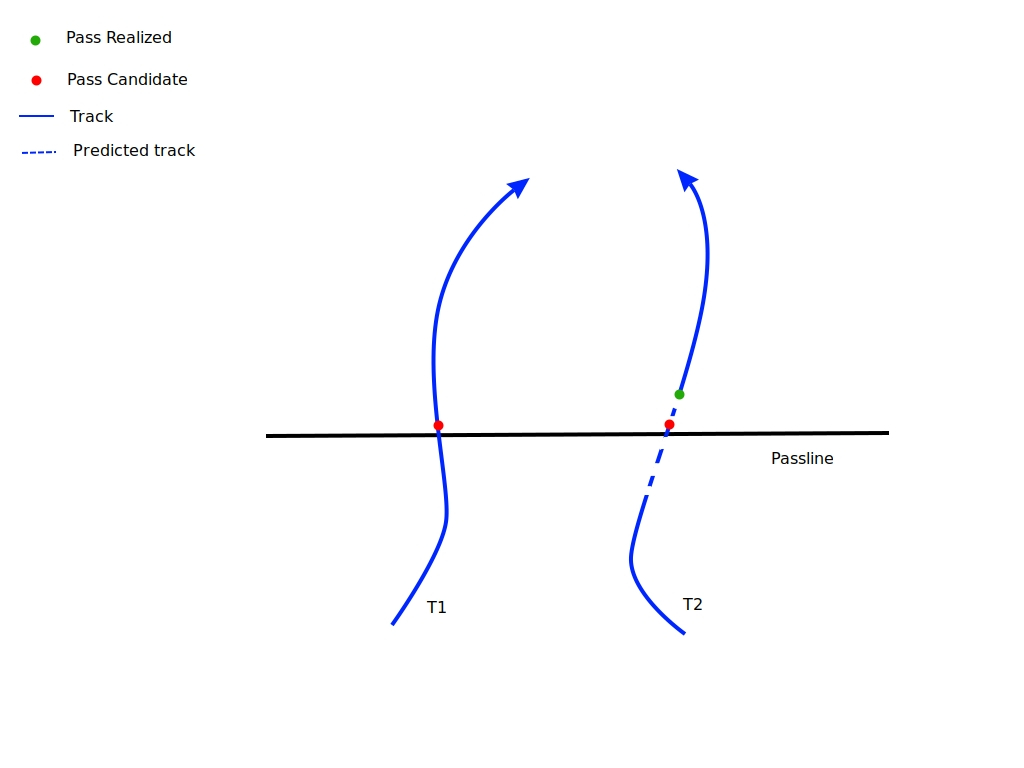Configuring Pass Detector
This microservice does not require GPU resources. Pass Detector processes records from a source topic and writes the result to its target topic.
Pass Detector can run in batch mode. When running in batch mode, the microservice stops after processing the last record. Otherwise it keeps running and waits for more records.
Environment Variables
KAFKA_PASSDET_MS_PROPERTY_FILE_PATHS: property file list
Properties
The values of properties with the .file extension are the paths of the .json
files, while the values of properties with the .data extension are the .json
configurations themselves.
Note Setting
.dataand.fileproperties are exclusive to each other, setting both of them results in an error.
For an example of Pass Detector properties, see Pass Detector Template Properties.
ultinous.service.kafka.passdet.ms.config.data
| Property | ultinous.service.kafka.passdet.ms.config.data |
|---|---|
| Description | Pass Detector microservice configuration, and optionally authentication and functional configuration. Content must be in one-liner JSON format described in Superconfig Topic Definitions. |
| Required | Required if ultinous.service.kafka.passdet.ms.config.file not given. |
ultinous.service.kafka.passdet.ms.config.file
| Property | ultinous.service.kafka.passdet.ms.config.file |
|---|---|
| Description | Path to a microservice configuration file. The file contents must be in JSON format, according to ultinous.service.kafka.passdet.ms.config.data above. |
| Required | Required if ultinous.service.kafka.passdet.ms.config.data not given. |
Microservice Configuration Example:
{
"source_options": {
"start":"START_DATETIME",
"start_date_time": "2019-05-31T10:30:00.000 +02:00",
"end":"END_NEVER"
},
"source": {
"broker_list": "127.0.0.1:6499",
"name": "some_kafka_topic.TrackChangeRecord.json"
},
"target_options": {
"handling": "REPLACE"
},
"target": {
"broker_list": "127.0.0.1:6499",
"name": "some_other_kafka_topic.PassDetectionRecord.json"
},
"config_data": { "...": "..." }
}
In this example, the sources are set to be read from the given date and never stop reading them. One track change source is defined with broker list and name. Existing messages in the target stream are replaced.
For an example of the properties of the config_data field, see the
Example of a PassDetConfigRecord.
ultinous.service.kafka.passdet.config.data
| Property | ultinous.service.kafka.passdet.config.data |
|---|---|
| Description | Pass Detector functional configuration. The PassDetConfigRecord definition should be in JSON format as defined in the Kafka configuration proto, see the example below. |
| Required | Optional |
| Value Type | string |
ultinous.service.kafka.passdet.config.file
| Property | ultinous.service.kafka.passdet.config.file |
|---|---|
| Description | Path to a functional configuration file. The file contents must be in JSON format, according to ultinous.service.kafka.passdet.config.data above. |
| Required | Optional |
| Value Type | string |
Example of a PassDetConfigRecord
{
"passLines": [
{
"id": "pass_1",
"poly": [
{"x": 100, "y": 500},
{"x": 1870, "y": 500}
]
},
{
"id": "pass_2",
"poly": [
{"x": 960, "y": 980},
{"x": 1000, "y": 560},
{"x": 960, "y": 100}
]
}
]
}
Note UVAP provides an easy-to-use tool for pass line configuration called Stream Configurator. For further information, see Stream Configuration.
ultinous.service.kafka.passdet.auth.defs.data
| Property | ultinous.service.kafka.passdet.auth.defs.data |
|---|---|
| Description | Authentication definition data in one-liner JSON format corresponding to the definitions described in Superconfig Authentication Definitions. |
| Required | Optional |
| Note | Required if ID based authentication is used in ultinous.service.kafka.passdet.ms.config.* |
ultinous.service.kafka.passdet.auth.defs.file
| Property | ultinous.service.kafka.passdet.auth.defs.file |
|---|---|
| Description | Authentication definition file path. Content of the file should be in JSON format described described in Superconfig Authentication Definitions. |
| Required | Optional |
| Note | Required if ID based authentication is used in ultinous.service.kafka.passdet.ms.config.* |
ultinous.service.kafka.passdet.monitoring.port
| Property | ultinous.service.kafka.passdet.monitoring.port |
|---|---|
| Description | Monitoring server port. |
| Required | Required |
| Value Type | uint16 |
ultinous.service.kafka.passdet.monitoring.threads
| Property | ultinous.service.kafka.passdet.monitoring.threads |
|---|---|
| Description | Monitoring server thread pool size. |
| Required | N/A |
| Value Type | uint16 |
| Default Value | 1 |
Changing the Configuration
It is possible to modify the configuration while Pass Detector is running. When you modify
the configuration files on disk, Pass Detector will not automatically reload them. Instead,
this can be achieved by posting a HTTP reload request through the monitoring port
of the microservice. (The monitoring port is given in the Pass Detector property file,
e.g. the Pass Detector Template Properties.)
For example:
$ curl -X POST http://localhost:6495/reload
will reload the configuration files.
Note The values of the
ultinous.service.kafka.passdet.monitoring.portandultinous.service.kafka.passdet.monitoring.threadsproperties cannot be changed.
The result of the reload operation is the same as if the service was stopped
and restarted with the new configuration. However, it can be done using the
microservice API, without maintenance privileges.
Empty Configuration
It is also possible to start Pass Detector with an "empty" configuration and switch to a valid configuration later. In this case, the service will be running and healthy but it will not process any inputs until an acceptable configuration is reloaded.
Attention In order for the service to run, even the "empty" configuration must contain a valid value for
ultinous.service.kafka.passdet.monitoring.port.
Invalid Configuration
Invalid configuration is treated the same way as empty configuration, i.e.
Pass Detector will run without processing any inputs. Note, however,
that at least ultinous.service.kafka.passdet.monitoring.port
needs to be provided for the service to run.
If changing the configuration results in any error, e.g. because of invalid
configuration, the reload request returns the error code 500. In this case,
Pass Detector will also continue running without processing any inputs.
Output Schemas
The schema definition of TrackChangeRecord and PassDetectionRecord can be
found in the Kafka data proto.
Example of a PassDetectionRecord from Kafka:
PASS_CANDIDATE:
{
"timestamp": 1564493689341,
"key": "pass_01",
"value": {
"type": "PASS_CANDIDATE",
"pass_candidate": {
"pass": {
"id": {
"track_key": "1564493689041_50187",
"serial": 0
},
"pass_line_id": "pass_01",
"cross_dir": "RL",
"section_idx": 0,
"cross_point": {
"x": 511,
"y": 500
}
},
"is_extrapolated": false
}
},
"headers": "[('format', b'json'), ('type', b'PassDetectionRecord')]"
}
PASS_REALIZED:
{
"timestamp": 1564493689341,
"key": null,
"value": {
"type": "PASS_REALIZED",
"pass_realized": {
"pass_event_ref": {
"track_key": "1564493689041_50187",
"serial": 0
}
}
},
"headers": "[('format', b'json'), ('type', b'PassDetectionRecord')]"
},
HEARTBEAT:
{
"timestamp": 1564493689341,
"key": null,
"value": {
"type": "HEARTBEAT"
},
"headers": "[('format', b'json'), ('type', b'PassDetectionRecord')]"
}
END_OF_TRACK:
{
"timestamp": 1564493689341,
"key": null,
"value": {
"type": "END_OF_TRACK",
"end_of_track": {
"track_key": "1564493689041_50187"
}
},
"headers": "[('format', b'json'), ('type', b'PassDetectionRecord')]"
}
Note: The
keyis empty in the following cases:
- The record is only a
HEARTBEATmessage.- The record is an end-of-track signal.
- The record is a Pass Realization (see below).
Pass Realization A
TrackChangeRecordtriggering a Pass Detection is not always derived from a "real" detection. The track change can also come from a prediction of the next track position. In this case, theis_extrapolatedfield of thePassDetectionRecordistrue. After the predicted detection the track usually continues with a "real" detection.
In this case a new PassDetectionRecord is inserted into the target topic with an
empty key but with the appropriate non-empty track_key.
See the Kafka data proto.
Feature Demo
For the pass detection feature demo, see Pass Detection Demo.

 Pass Detection Example
Pass Detection Example